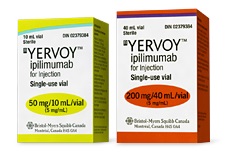
Three months after Britain's National Institute for Health and Care Excellence (NICE) said it would not recommend Bristol-Myers Squibb's ($BMY) Yervoy as a first-line treatment for melanoma, the much-feared cost-effectiveness agency has changed its mind. A new draft guidance from NICE now says Yervoy (ipilimumab) should be available as the first choice for treating patients with advanced melanoma. The final guidance is expected in late July.
The sharp U-turn is not all that surprising considering how widely NICE was criticized for its initial opinion of Yervoy. In February, the agency suggested limiting Yervoy access to patients in clinical trials or to those who failed other therapies. NICE complained that BMS had only provided data for the drug at a dose of 10 mg/kg, which is larger than the actual licensed dose. Physicians balked, and BMS shot back with a statement pointing out that 12,800 people in the U.K. are diagnosed with melanoma every year. The company vowed to appeal the decision.
NICE changed course after reviewing a boatload of new data provided by BMS, including four completed Yervoy trials and two ongoing trials in the U.S., according to the draft guidance. The material included data from trials of Yervoy at the smaller licensed dose of 3 mg/kg. Experts estimate that Yervoy, which has extended some patients' lives by 10 years, could help up to 2,000 patients in the U.K. each year, according to The Telegraph.
 |
| Bristol-Myers Squibb CEO Lamberto Andreotti |
Yervoy is a leader in a new class of oncology treatments known as "immunotherapy" drugs and it has been a major boost for BMS. In 2013, Yervoy and another of the company's cancer drugs, Sprycel, helped drive total sales up 6% year-over-year to $4.44 billion, beating analyst estimates by more than $100 million. In the first quarter of this year, sales of Yervoy jumped 18% over the same period a year ago to $229 million. CEO Lamberto Andreotti told investors earlier this year he believes immunotherapy has "transformational potential" for BMS.
And the impressive trial results keep pouring in for Yervoy. Earlier this month, BMS released extended survival data from an early-stage trial of the drug in combination with its PD-1 inhibitor nivolumab. The one-year survival rate for patients taking the combo was 94%, while the two-year survival rate was 88%.
- access the NICE statement and draft guidance here
- here's The Telegraph story
- read more at PharmaTimes